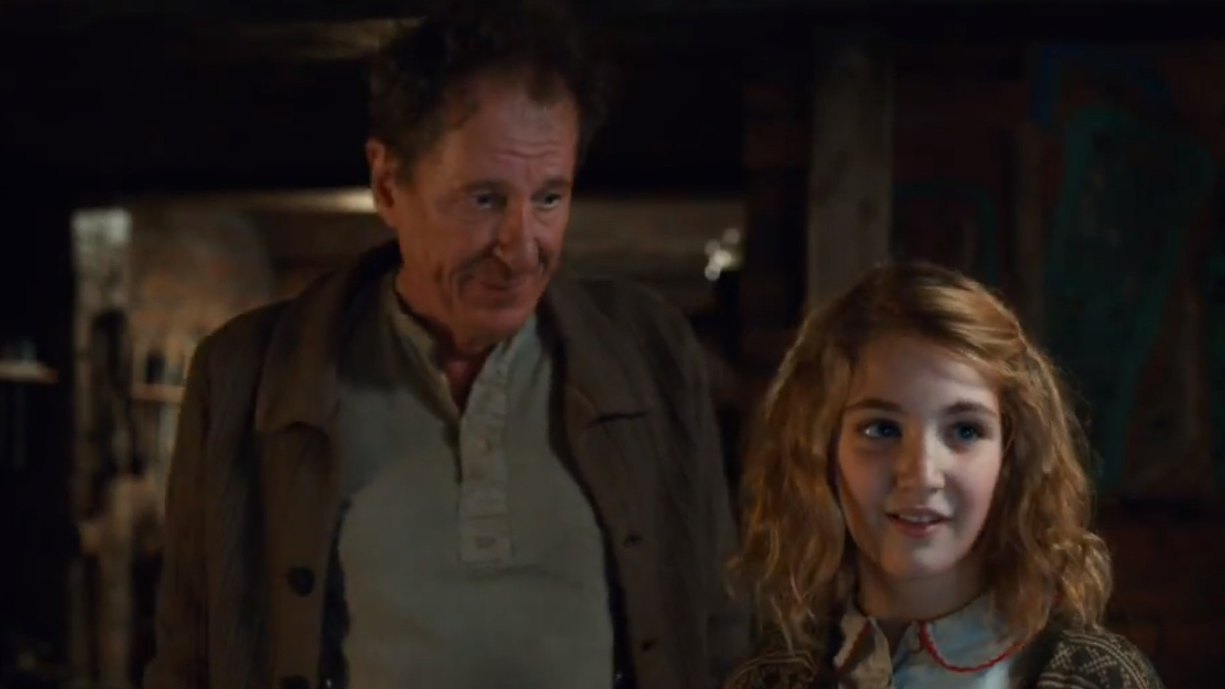"I'm always finding humans at their best and their worst," concludes Death, narrator of the new film, The Book Thief, "I see their ugliness and their beauty, and I wonder how the same thing can be both."
"I am haunted by humans."
The Oscar-nominated film The Book Thief is indeed a haunting look at humanity, although an unexpected one for a World War II film.
The film opens in 1938 as a train barrels across Nazi Germany. Liesel Meminger and her brother are soon to be settled in a foster home. Liesel hums a lullaby, and next to her, her mother holds her younger brother's listless body. Suddenly, he is glassy-eyed. "Mama!"
"It's not what you call a soft opening, to meet this 10-year-old girl whose 6-year-old brother dies on page one," says Geoffrey Rush, who plays the role of Liesel's foster father, Hans Hubermann. "Then in the next scene, her mother's a Communist and gets taken away. I can't think of many films that start with a 10-year-old with a burden that's comparable to Hamlet's."
Death, both as voice and violent reality, opens and closes the film. Nevertheless, some critics have called the adaptation too safe and sanitized. "The brute facts of the Second World War in Germany—Nazi oppression, hunger, people hiding in basements—have been turned into a pleasantly meaningless tale of good-heartedness," writes Brian Denby of The New Yorker.
It's true that The Book Thief is better on page. As a screenplay adapted from Markus Zusak's 2007 novel, it would have benefitted from more judicious narrative selection. Some characters and plotlines remain woefully underdeveloped, and Death, as narrator, lacks the credibility it had in the book.
But despite the flaws and the film's occasional sentimental lapse, The Book Thief is hardly meaningless. It powerfully portrays one dimension of the Christian story: the glory of humanity.
As a biblical word, we recognize glory. "For thine is the kingdom and the power and the glory forever." Glory, as a word meaning luminous beauty and the weight of dignity, is one of the best of our churchy words. We just don't recognize it as a word belonging to humans.
Nevertheless, in The Book Thief, Hans Hubermann is a glorious man—as only a human can be. In the finitude of time and space.
"Your majesty," Hans says, eyes twinkling, to coax a reluctant Liesel from the car when she first arrives at the Hubermann home. Learning soon after her arrival that she cannot read, Hans agrees to teach Liesel from the Gravedigger's handbook, which she stole on the occasion of her brother's burial. "I'm not such a good reader myself, you know. We'll have to help each other out."
He does more than school Liesel in the fundamentals of the alphabet, however. Throughout the film, Hans teaches Liesel what it means to be human. "A man is only as good as his word," says Hans, explaining to Liesel why they've taken in a Jew and bidding her to silence.
Max finds refuge for the better part of two years in the dark damp of the Hubermann basement, the only place he may succeed in eluding discovery. But his ratlike existence beneath the stairs is made human in moments like Christmas night, when the family hauls in snow to build a snowman in the basement. Huddled in blankets, they sing "Silent Night" to the accompaniment of Hans's accordion. It's the best Christmas ever, exclaims Liesel.
Except the following morning, Max is found feverish and unresponsive, the snowman, a puddle of chill.
"Why did we build it?" Liesel asks Hans, terrified she is to blame.
"Because we had to," he reassures. It made us human.
This is Hans's pledge: to be human in the midst of inhumanity. When the villagers flee late one night to take cover in a bomb shelter, Hans carries his accordion with him. Soon, "The Blue Danube" plays accompaniment to the beat of bombs. When a Jewish shopkeeper is being arrested and taken away ("They found his birth certificate," some onlookers tell Hans. "He's a Lehman with one n, not two."), Hans intervenes.
"What is your name?" a Nazi solider demands. "Hans. Hans Hubermann." A name. Hans offers it as singular proof of his humanity, and this is both his protest— and glory. If the film portrays a naïveté about Nazi Germany—a deliberate ignorance and insulation from the real gruesomeness of that history—it may well be because Hans and his humanity have instinctively shielded us from it.
"What God wants from humans and what only humans can do is become fully human," writes David Benner, in Soulful Spirituality: Becoming Fully Alive and Deeply Human. "St. Irenaeus understood this well. His famous declaration—Gloria Dei vivens homo—proclaimed that the glory of God is men and women who are fully alive, fully human."
We have plenty of other films, like Inside Llewyn Davis, which do their due diligence with human depravity. ("We are, as a species, ridiculous: vain, ugly, selfish and self-deluding," concludes the New York Times' movie critic from the newest Coen brothers' film.) Instinctively, we recognize the worst in ourselves, and this lends an immediate believability to horror.
But glory? Humans as glorious? Empirically, we can verify this less frequently. In fact, we may only know it to be true because the Scriptures insist on the work of the glorious Man-God, whose suffering is meant for restoring each of us to our (derivative) glory (Heb. 2:10).
The Book Thief takes a human being and makes him glorious, and this is its important contribution. Perhaps it spares us too gently of history's horrors. But then again, maybe it reminds us less who we are and more who we are becoming.
And in the Christian story, glory is no less credible than infamy.









